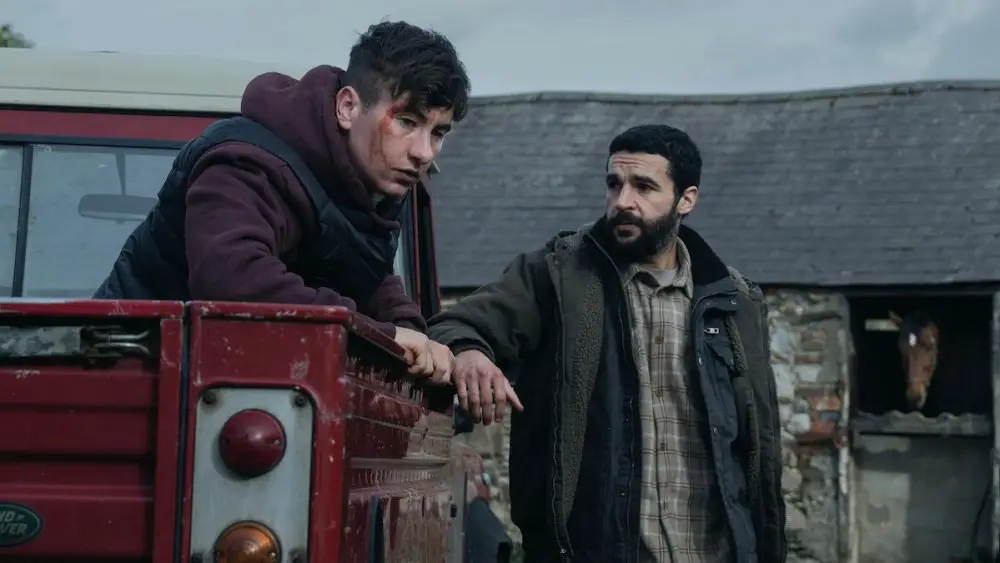Christopher Andrews’ directorial debut, Bring Them Down, a brutal drama of violence set in the Irish countryside, alternates between pitch black humor and pervasive melancholy. A tale of father, son, and a wounded sheep, it toys with narrative point of view in a Rashomon-esque way, but pressing questions about masculinity and the cycle of grief keep hovering just outside of view. As with the emotionally immature male characters, it never confronts these concepts head-on, instead quietly building them into a smoldering blood feud that feels all-encompassing in the moment, but whose pathetic nature becomes apparent when you step back.
Alternating between confusion and silence, a short but heartbreaking prologue reveals a car accident in which Michael (Christopher Abbott), overcome by emotion after learning that his mother plans to leave his father, speeds off the road. His mother, who was in the passenger seat, is killed in the crash. His then-girlfriend, Caroline (Nora Jane Noone), was also in the car, and she bears a noticeable scar on the left side of her face, a vivid illustration of how women bear the brunt of men’s uncontrollable rage.
Years later, Michael lives with his demanding, paraplegic father, Ray (Colm Meaney), tending his father’s sheep farm day and night. Coincidentally, Caroline is married to Michael’s neighbour and rival, Gary (Paul Reddy), and has a teenage son, Jack (Barry Keoghan). The weight of past trauma has already created tension between the two families, and this is exacerbated when two of Michael’s sheep are found dead on Gary’s land. Soon, things escalate and suspicions grow. Many of Michael’s livestock are seriously injured, forcing Michael to cull them one by one.
“Bring Them Down” creates a disconcerting atmosphere about Gary and Jack by revealing this quiet storm from Michael’s point of view, accompanied by thumping, discordant music. They are kind to Michael one moment and cold to him the next. Further complicating matters is the fact that Caroline is still kind to Michael, but no longer seems to have any warmth towards her husband. Yet every time Michael sees her face he can’t help but be reminded of his actions.
Who is responsible for each violent turn of events (and, more importantly, why) is revealed gradually but deliberately. For much of the film’s first half, Andrews has Michael journey through the nighttime landscape, hiding it until he reveals violent imagery at a specific, gut-wrenching moment – either to garner followers or to exact revenge against a father-son duo that seems downright sociopathic. But as the film pulls back and unfolds new layers on seemingly antagonistic characters, Michael begins to lose his mind in the same way, plunging all three men (four, if you count Ray) into a deeply dispiriting, at times depressingly funny story in which bloodshed is all but inevitable.
Though none of the characters express religious or superstitious beliefs (though the tight-lipped guy doesn’t say much in words anyway), the initial premise of “Bring Them Down” feels cursed. Michael’s sheep are undoubtedly innocent victims of something bigger, but the vague feeling that he may deserve this punishment for his past sins (or at least believes he does) is inevitable, giving the film a purgatory-like atmosphere. Meanwhile, the pressures exerted on him by his father and on Jack by Gary force Abbott and Keoghan’s characters to collide, eliciting quietly troubled performances from both that occasionally erupt into unsettling outbursts. Both actors are fascinating to watch, and they manage to operate in completely different modes within the same narrow framework, depending on whose perspective the film reveals.
Andrews carves out clear spaces for implications within what should seem a literal and straightforward story, forcing the audience to consider truths that the characters do not (even unconsciously) confront. For example, Ray is unaware of Michael’s involvement in his wife’s death, but he often laments her death out loud in front of him, as if he were somehow challenging him. Similarly, Caroline’s crumbling marriage and her lingering affinity for Michael force us to wonder whose son Jack really is. This question is never explicitly addressed, but takes on greater thematic importance in the context of the film’s father-son musings. Both Jack and Michael become victims of their family circumstances and each other’s selfishness, as if they are the key centers of this story of inherited violence and hatred.
When conflict finally erupts between the two, “Bring Them Down” forgoes the visual bombast of revenge movies, robbing the brewing conflict between the two families of any real appeal. The essence of the film lies in the lack of stylization in its most violent scenes, which makes its brutal characters seem pathetic in the end, reduced to squabbling children, roles imposed upon them by forces greater than themselves: their fathers, their lineage, their economic circumstances. It’s grimly funny, and comically sad.
